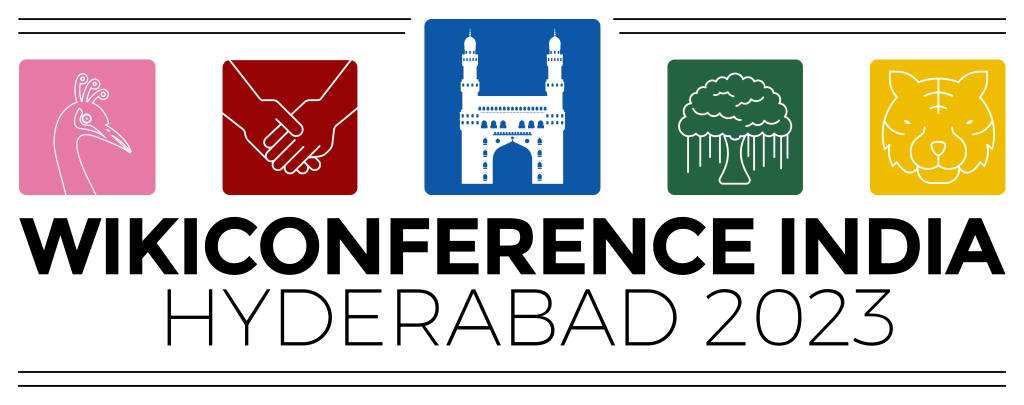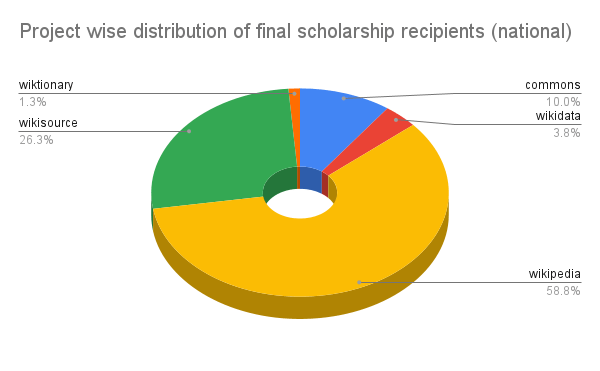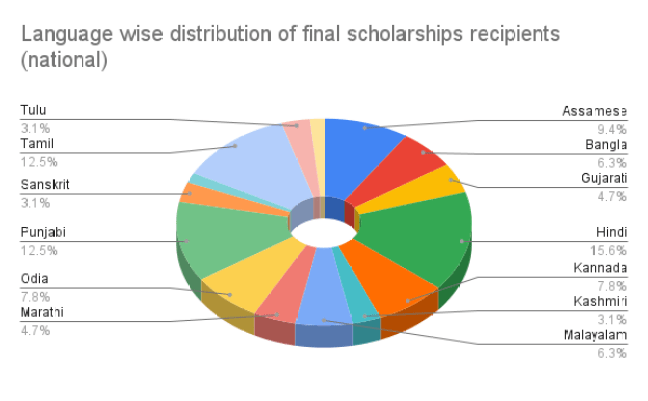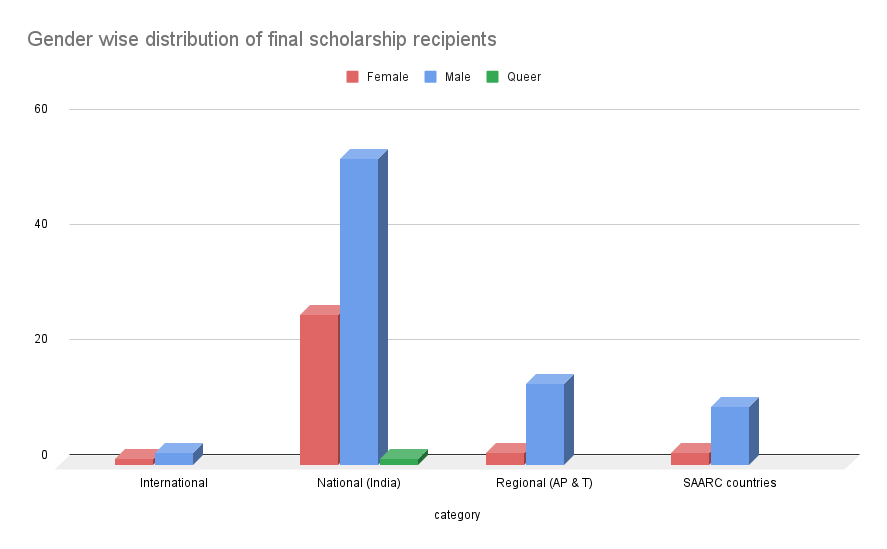WikiConference India 2023 (WCI 2023) is a national-level conference that provides a common platform for Wikimedians and stakeholders interested in Indic-language Wikimedia projects and other aspects of the movement in India and a few South Asian regions. This is a space to meet, connect, share stories, learnings, best practices, and challenges, and discuss the future strategy of our region. The conference will take place in Hyderabad from 28 to 30 April 2023.
This blog is a part of our series to document the approach, process, and vision of the WCI Core Organizing Team in planning WCI 2023 and aims to not only document but also provide a learning ground while planning any further conference. Before you proceed further, if you haven’t read already please read our first blog post on Unveiling the Themes of WikiConference India, 2023
WikiConference India is a planned gathering of Wikimedians based in the Indic region to come together and discuss the future of the movement in the region. While the conference convenes the Indian communities, the COT ensured the participation of community members from South Asia who could also benefit from attendance, discussion, and bonds. Thus, furthering our commitment to our core theme and value- Strengthening Bonds.
Scholarships are a major part of any WikiConference and provide support and resources to enable the participation of our movement and important stakeholders. Traditionally, scholarships cover travel, accommodation, food, registration, and other incidentals associated with participation.
In this blog, we will delve deeper into the approach, process, and execution of the Scholarships Program under WCI 2023 for which applications were open from 11 November to 14 December 2022.
OUR APPROACH TOWARD SCHOLARSHIPS
As one of the key themes and aims of the conference is to strengthen bonds while encouraging collaboration, diversity, and vibrance within the community, the scholarship committee finalized a criterion to ensure balanced representation. Overall impact across the movement was the core theme of deciding scholarships and the details of the criteria can be found here on our meta page. Some of the main considerations were on–wiki contributions, community engagement, leadership demonstration, added value to the conference, and some special considerations from the submissions in the scholarship form that were found recognizable. Engagement with the Indic community was a special consideration for international scholarship recipients.
SCHOLARSHIPS CATEGORIES
As per the defined structure in the grant request, there were four categories of scholarships based on regions-
- National: Wikimedians residing in India (~80)
- Regional: Wikimedians based in Andhra Pradesh/Telangana (conference host region) (~20)
- South Asia: Wikimedians based in South Asia but outside India (~10)
- International: Wikimedians who have supported the South Asian movement but not residing in the region (~3)
FINAL OUTCOMES
The call for applications closed with 274 applications in total with a breakup of 200 national, 23 regional, 10 International, and 41 applications from the South Asia region.
In terms of final selection, out of the 274 applications 111 were initially selected- 80 (national), 16 (regional), 12 (South Asia), and 3 International.
Note: While the committee focused on balancing general representation in scholarship recipients, there were some limitations like fewer applications from women and certain language communities, that impacted overall representation. The overall statistics indicate that 33% of the scholarship recipients identify as women but it is also important to note that in the language breakup, there were some communities where there were no applications from women.
The selected recipients showcase a diverse background, interests, and contributions, not only on language but also on Wikimedia projects they work on.
| Countries (7) | India, Bangladesh, Sri Lanka, Nepal, Sweden, UK, UAE |
| Projects (6) | Wikipedia, Wikisource, Wikimedia Commons, Wikidata, Wiktionary, MediaWiki |
| Languages (15) | Assamese, Bangla, Gujarati, Hindi, Kannada, Kashmiri, Malayalam, Marathi, Odia, Punjabi, Sanskrit, Santali, Tamil, Tulu, Urdu |
| Gender Balance | 1 (Queer)/ 33% (Female)/ 64% (male) |
| Content/Techincal Contributors | 86/14 % |
KEY TAKEAWAYS
- Review Process
- The scholarship committee consisted of 12 members having experiences in technical and non-technical areas, seasoned Wikipedians and newcomers, people working on content and outreach, 35% are females, and a person identifying as queer.
- We reviewed the applications from an Internation>South Asia>India perspective considering travel needs and timelines. Each scholarship application was randomly assigned to 3 reviewers, and the final score is an average of all three review scores.
- The data about each applicant’s edit count, articles count, user rights, block log, etc. was gathered from various data sources including Central Auth and XTools. This data combined with the scholarship application responses submitted by applicants was used to review applications.
- Diversity Factors
- Given the diversity in the region, selecting scholarship recipients from a single overall list would risk leaving out on relatively smaller language and project communities. Instead, based on the average monthly editors’ data per language and project, initial allocations for each language (further split by project) were decided. For example, if Kannada contributes to 9% of active editors from India, then around 7 slots of 80 were allocated to Kannada. This was further broken down by various Wikimedia projects such as Wikisource, Wikivoyage, and Wiktionary.
- Further, these allocations were manually adjusted to ensure smaller communities don’t lose out based on community size. For instance, compared to Hindi, Santali which is a smaller community, would get no scholarship when rounded off by percentage spread.
- Slots were also allocated for members who contribute to Wikimedia technical areas, English language projects, and multilingual projects such as Wikidata and Wikimedia Commons.
- Final Selections
- From this, an initial list was prepared. We kept in mind that an applicant with relatively fewer contributions is not given a scholarship just because they are the only person who applied from that category.
- When applicants got dropped, the rest of the slots were filled based on the top-ranking applicants from the overall list. The final list was sent to WMF T&S and reviewed by the COT. Special concerns were voted upon by the committee and decided. (open slots were reallocated from the overall list).
- Focus on representation
- Initially, our goal was to maintain a gender balance of at least 40% women and representation from non-binary genders. However, this changed since we had people who declined the scholarship, and the slot was awarded to people from the general waitlist.
The scholarship committee had been constantly striving to improve and fairly evaluate and bring representation from various types of communities, projects, and contributors to the projects to participate in the conference. This may not be perfect, however, it has been a great learning and hopefully pass this on to the next conference organizers. If you have any comments or suggestions please reach out to contact@wikiconferenceindia.com or drop a comment below.

Can you help us translate this article?
In order for this article to reach as many people as possible we would like your help. Can you translate this article to get the message out?
Start translation



